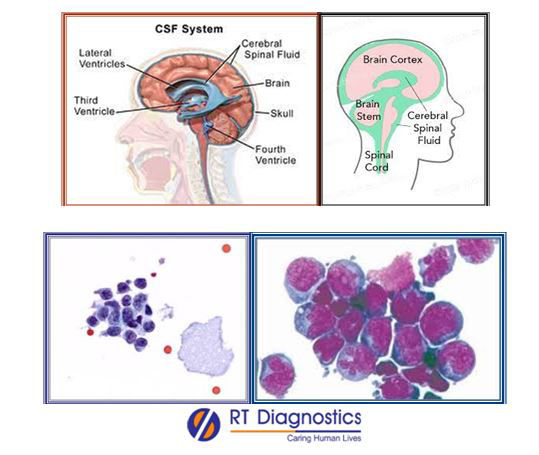Cytology – CSF:
Why Cytology - CSF Test?
CLINICAL INFORMATION
CSF is cerebrospinal fluid is a body fluid that flows in the space around the spinal cord and brain. . Test for CSF analysis is performed to help diagnose diseases or abnormal conditions that affect the brain (CNS) and spinal cord. Cytology of CSF: Cytology is a study that examines the study of cells under a microscope. Hence a cytological examination of CSF also helps in identifying the presence of harmful infectious micro-organisms along with inflammatory cells like WBCs etc, on microscopic evaluation. The identification of the infectious causative agent is thus identified (eg. Gram-positive or Gram-negative) to arrive at a definite diagnosis for starting effective medication (such as broad-spectrum or narrow-spectrum antibiotics) against it. Additional tests include ESR, CRP, D-dimer, Electrophorosis, Culture and Sensitivity Tests etc. Electrophoresis is an analytical technique used in chemistry for separating biomolecules. Electrophoresis is exclusively applied (like blotting techniques – southern blot, northern blot, western blot etc) in the biochemical analysis of unknown sample specimens of the patients. Oligoclonal bands are proteins called immunoglobulins. The abnormal presence of these bands (an indicator of illness) in the CSF indicates infection, inflammation and/or neoplasm of the CNS eg. multiple sclerosis, neurosyphilis, acute bacterial or viral meningitis like HSV encephalitis, progressive multifocal leukoencephalopathy, subacute sclerosing panencephalitis, polyneuritis, optic neuritis, trypanosomiasis, progressive rubella panencephalitis, Guillain Barre, neoplasm and/or other infectious or auto-immune diseases etc. The culture and Sensitivity test also, in addition, helps to detect underlying pathologies. The main objective of performing this C/S test is to check for the presence of the pathogenic organism and its growth in the given suspected sample specimen. Hence this test helps to detect the presence of any systemic infection eg. septicemia that can lead to sepsis (a life-threatening complication). Thus CSF culture and sensitivity test detects the presence of pathogenic infection. Moreover, Anti-microbial sensitivity tests (also known as susceptibility testing) are also performed in addition, to appropriate antibiotic treatment & for better prognosis.

General Instructions:
Sample Requirement: Specimen – CSF. Test Preparation: None.
NOTE - Sample for specimen collections may vary based on the patient’s condition/cases according to the patient’s presenting complaints/signs or symptoms:
SPECIMEN REQUIREMENT (Special or Rare Cases) - As instructed and guided by Physician / Clinician / Pathologist / as per Laboratory’s requirements, according to procedures and protocols.
This Multi-Specialty Clinical Referral Laboratory RTDIAGNOSTICS provides precise and accurate tests with an extensive range of testing services to the medical centres to help in the diagnosis and identification of pathology in the test specimens for infectious diseases and also to evaluate the function of organ systems of the patient. It prevents further complications and helps to stabilize and restore health to near normalcy at the earliest without delay.



